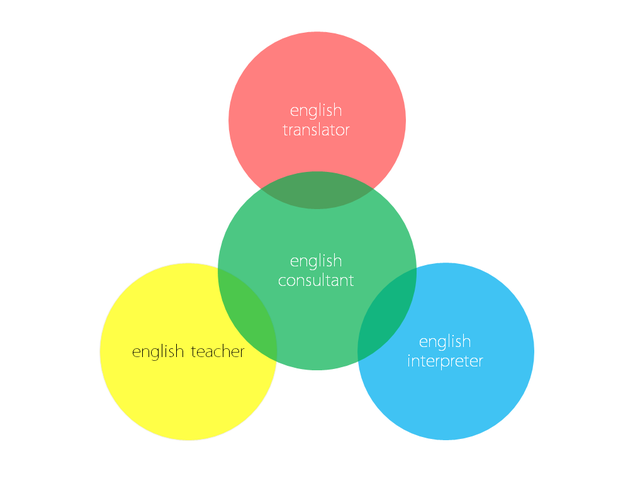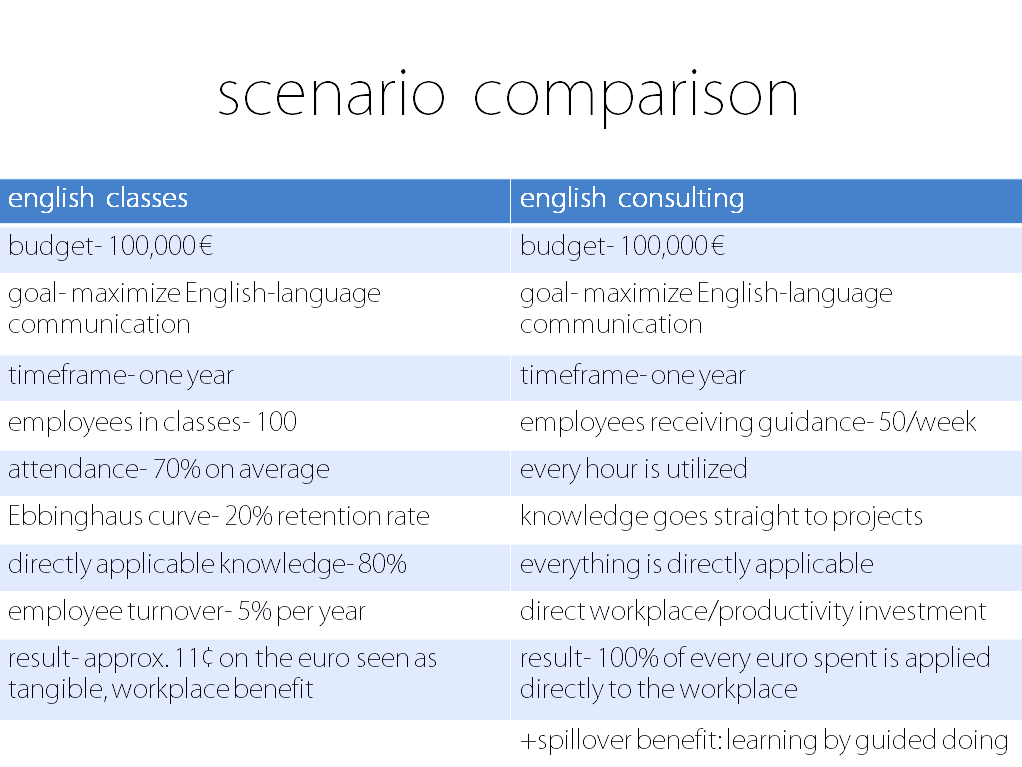| Luke Boardman |
English consulting

Spending 30+ hours per week teaching English on corporate campuses all over Southern Germany has taught me that at the end of the day, most employees just want to complete specific tasks. After class, students often come up to me and say something to the effect of, "Thanks for the lesson, but do you have time to help me write a response to this email?"
The traditional English-teaching paradigm has employers sending their workers to class once per week for 1 - 2 hours. A course typically lasts for half a year or so. Whatever new language skills the students don't forget between lessons they often lose quickly after the course ends. I have been living in Germany for the last four years, surrounded by the language nearly 24/7. I took German for three years in high school and studied it for five semesters at the university, and despite all of that, becoming fluent in German has been one of the hardest things I've ever done (and continue to do). A five-month, once-per-week course isn't going to cut it. And so year after year, employers accept nearly imperceptible returns on the investments they make in English-proficiency.
Document translation is a far more practical and immediate aide for employees, and translation services can work well for long documents, but it's far from a frictionless process: a translation can take days or weeks to complete. Another problem with translation is the lack of real-time feedback. Much of language is context-based and the translator often has to make educated guesses about the intent of the writer. Because the original author isn't in the room working together with the translator, some of these guesses will invariably be wrong.
We need a new concept.
I am proposing a different solution- the English Consultant. The English Consultant is embedded in the office with the workers they're helping. The English Consultant is not there to teach general concepts, but rather to complete specific tasks. Think of the English Consultant as a human Google Translator. They can give advice on phrasing, grammar, and word-selection, as well as insights into the culture of the English speakers your employees are trying to communicate with.
Because the English Consultant is seamlessly integrated into the office, they're able to offer on-demand guidance the moment it's needed to whomever needs it. In English classes, participants are selected beforehand and remain constant for the duration of the course. The English Consultant on the other hand can change priorities fluidly based upon ever-changing, project-specific needs.
In addition to helping employees conduct their daily business, the English Consultant can also counsel decision makers when it comes to choosing or evaluating other English-language services. Who is auditing your English-language website for embarrassing typos, or ensuring that the translation service you use is producing accurately-translated documents?
While the focus of English consulting is not teaching, learning by guided doing is an unavoidable spin-off benefit. Why send employees to class every week to practice doing things that are similar to their work, when you can have an English consultant working beside them in the office, helping them to actually do their work?
The end result of switching to an English Consultant strategy to deal with the English-language challenges in your company?
100% of every Euro spent is felt as direct, tangible benefit.
Happy customers. Impressed partners. Sympathetic suppliers.
The traditional English-teaching paradigm has employers sending their workers to class once per week for 1 - 2 hours. A course typically lasts for half a year or so. Whatever new language skills the students don't forget between lessons they often lose quickly after the course ends. I have been living in Germany for the last four years, surrounded by the language nearly 24/7. I took German for three years in high school and studied it for five semesters at the university, and despite all of that, becoming fluent in German has been one of the hardest things I've ever done (and continue to do). A five-month, once-per-week course isn't going to cut it. And so year after year, employers accept nearly imperceptible returns on the investments they make in English-proficiency.
Document translation is a far more practical and immediate aide for employees, and translation services can work well for long documents, but it's far from a frictionless process: a translation can take days or weeks to complete. Another problem with translation is the lack of real-time feedback. Much of language is context-based and the translator often has to make educated guesses about the intent of the writer. Because the original author isn't in the room working together with the translator, some of these guesses will invariably be wrong.
We need a new concept.
I am proposing a different solution- the English Consultant. The English Consultant is embedded in the office with the workers they're helping. The English Consultant is not there to teach general concepts, but rather to complete specific tasks. Think of the English Consultant as a human Google Translator. They can give advice on phrasing, grammar, and word-selection, as well as insights into the culture of the English speakers your employees are trying to communicate with.
Because the English Consultant is seamlessly integrated into the office, they're able to offer on-demand guidance the moment it's needed to whomever needs it. In English classes, participants are selected beforehand and remain constant for the duration of the course. The English Consultant on the other hand can change priorities fluidly based upon ever-changing, project-specific needs.
In addition to helping employees conduct their daily business, the English Consultant can also counsel decision makers when it comes to choosing or evaluating other English-language services. Who is auditing your English-language website for embarrassing typos, or ensuring that the translation service you use is producing accurately-translated documents?
While the focus of English consulting is not teaching, learning by guided doing is an unavoidable spin-off benefit. Why send employees to class every week to practice doing things that are similar to their work, when you can have an English consultant working beside them in the office, helping them to actually do their work?
The end result of switching to an English Consultant strategy to deal with the English-language challenges in your company?
100% of every Euro spent is felt as direct, tangible benefit.
Happy customers. Impressed partners. Sympathetic suppliers.

